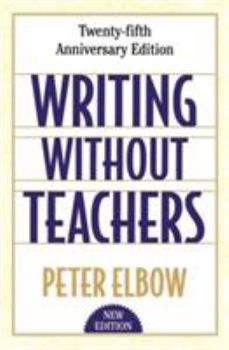Writing Without Teachers
Select Format
Select Condition 
Book Overview
In Writing Without Teachers, well-known advocate of innovative teaching methods Peter Elbow outlines a practical program for learning how to write. His approach is especially helpful to people who get "stuck" or blocked in their writing, and is equally useful for writing fiction, poetry, and essays, as well as reports, lectures, and memos.
The core of Elbow's thinking is a challenge against traditional writing methods. Instead of editing and outlining...
Format:Paperback
Language:English
ISBN:0195120167
ISBN13:9780195120165
Release Date:June 1998
Publisher:Oxford University Press, USA
Length:240 Pages
Weight:0.40 lbs.
Dimensions:0.5" x 5.5" x 8.0"
Related Subjects
Creative Writing & Composition Criticism & Theory Education Education & Reference Education Theory History & Criticism Language Arts Lesson Planning Literature Literature & Fiction Reference Rhetoric Schools & Teaching Textbooks Words, Language & Grammar Writing Writing Skills Writing, Research & Publishing GuidesCustomer Reviews
5 ratings
One of the best books about writing, bar none
Published by Thriftbooks.com User , 15 years ago
Elbow has insight into the writing process that is matched by very few. This book, in fact any book by him, should be a requirement in any writer's library.
Not Elbow's best
Published by Thriftbooks.com User , 18 years ago
This book consists basically of three parts. In the first part, Elbow describes his 'freewriting'-approach to writing: growing & cooking. In the second part, Elbow writes about his idea of the 'teacherless writing class'. The third part is Elbow's appendix-essay wherein Elbow analyses the intellectual approaches to criticism (or as he calls it the relation between 'the doubting game' and 'the believing game'). As Elbow explains in the long introduction to the second edition, this book is Elbow's personal statement on writing. It was written in part out of dissatisfaction with many approaches to writing at universities, partly out of Elbow's own existential struggles with writing (as well as with other aspects of his personal life). In a sense, this book presents Elbow's anti-establishment ideas on writing and learning. As a writing book, this is not Elbow's best. Many times, Elbow writing in this book remains abstract and is rather wordy. Consider this passage: "Simple reversal: starting to write X and seeing, thorugh development of X, that Y is right. I couldn't get there directly. I remembered I had even considered Y first, but I hadn't believed it. I had to go through X first before I could really understand Y." (36) There are more passages like this one. I definitely recommend Elbow's "Writing with Power", since that is a brilliant book. I read that book first and then turned to this one, since I hoped to find more details on the growing & cooking process. However, "Writing with Power" is great for its conciseness and because of the many lively examples that he uses there - unlike this book. "Writing without Teachers" could have been so much better... a pity, since I am a fan of Elbow's approach.
freewriting + public review
Published by Thriftbooks.com User , 21 years ago
In addition to free-writing, and the overall strategy of how to write a theme with limited time (commented by earlier reviewers), the author also shows the importance of getting feedback on your writing. He encourages you to organize groups of like-minded authors to review each other's writing. There is a very specific protocol for this... and its easy to screw up, so you really need to get the book to find out the details.Without such feedback you will not be able to understand what the reader is thinking as he reads your work. Elbow is not describing how to get "feedback" but how to understand the effect your writing has on the reader. In these meetings each individual describes what was going on in his head, what he remembers... not whether he liked your work. Thus, you see the effect.All three of my Peter Elbow's books have been extremely helpful. My only complaint is that his writing is too wordy. However, his wordiness is pleasant to endure. This book is easily worth a 5 out of 5.John DunbarSugar Land, TX
Alternative view to writing
Published by Thriftbooks.com User , 24 years ago
There are some great ideas in this book, it presents some fanstastic building points for any kind of writing. It's a little unconventional, and if you do everything he says, you might find you confuse your readers. But brain-opening all the same.
Don't edit while you write! Write first, edit later.<br>
Published by Thriftbooks.com User , 27 years ago
Since I first read Writing without Teachers in 1985, I've written - or helped write - proposals that have won 8-figure engineering contracts. (Yes, that's $10M+.) Prior to reading this book, I'd never written a winning proposal. I owe Peter Elbow a lot! His most useful prescription is not even the core of the book, but it literally taught me how to write. It's this: if you have to write something you understand, you have only four hours, and you don't know where to begin, do the following. Hour one: write for an hour without stopping, editing, organizing, or trying to do well; stop at the end of the hour and identify your strongest points. Hour two: start with those points, write just as you did in the first hour, and then extract your best points. Hour three: same routine again. Hour four: now that you know what you're talking about, capture your best points, organize, and write a structured final draft. Sounds simple, but it's the best advice for breaking through writer's block I've ever heard. Peter Elbow's prose style is simple and straightforward. He's not quite as much fun to read as Natalie Goldberg (Writing Down the Bones) or William Goldman (Adventures in the Screen Trade) or Lawrence Block (too many to mention), but his advice was so well-timed that I owe him - big-time.





